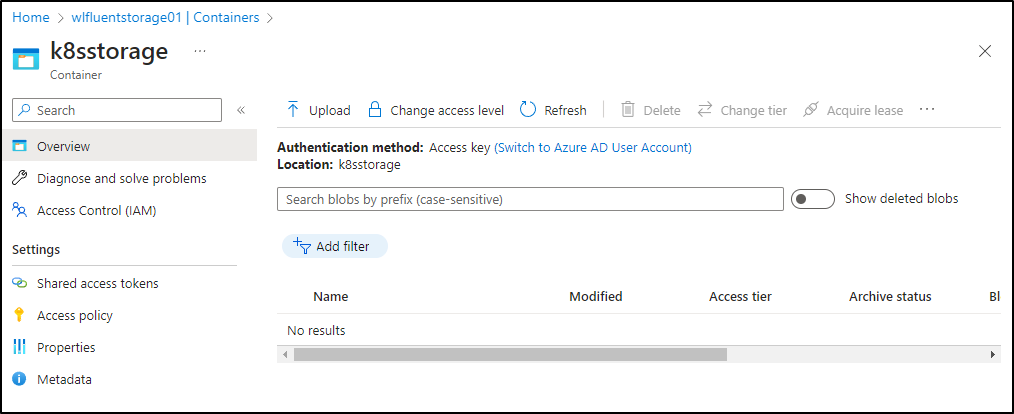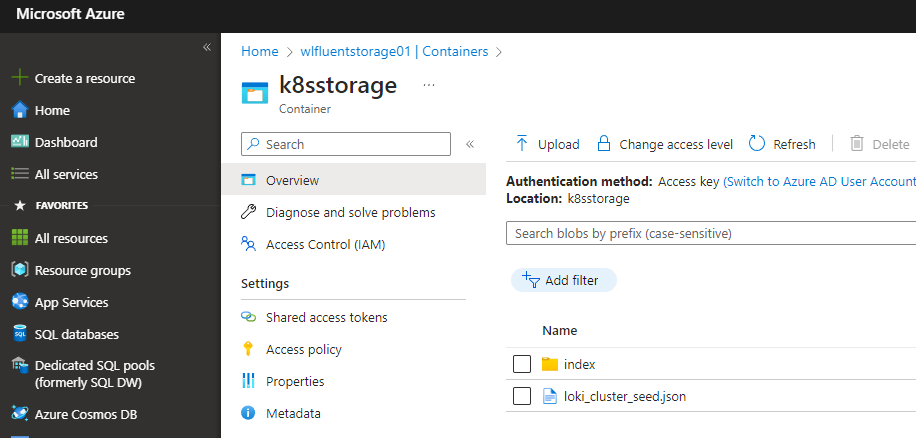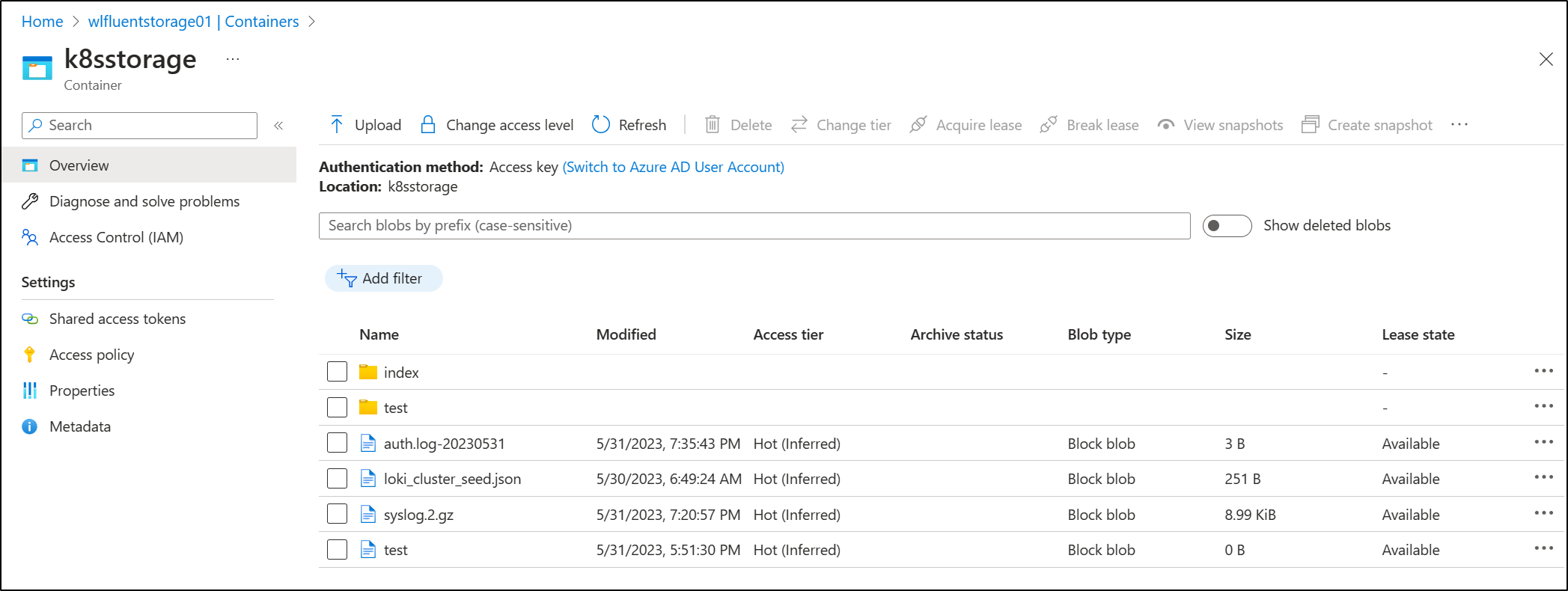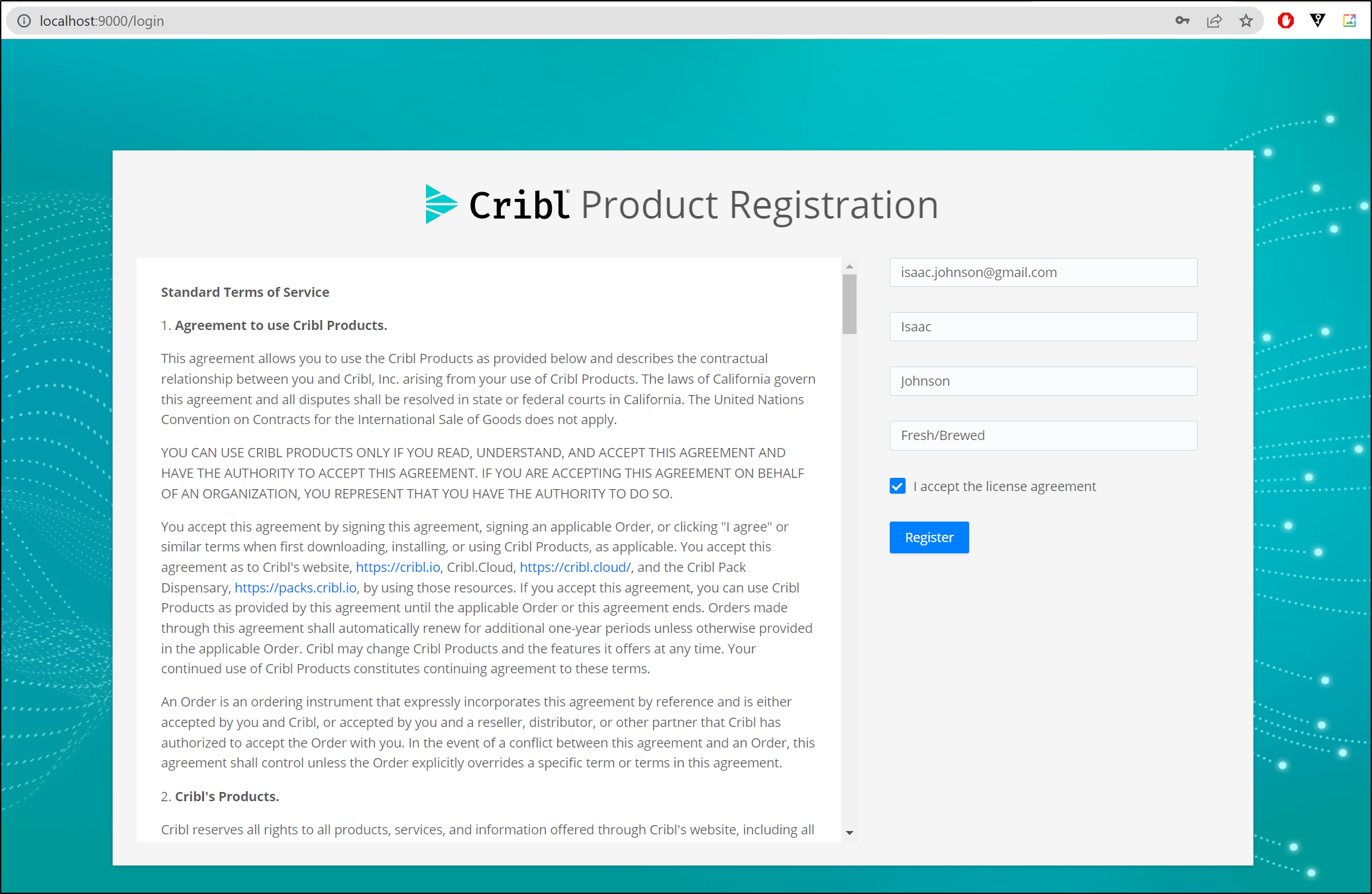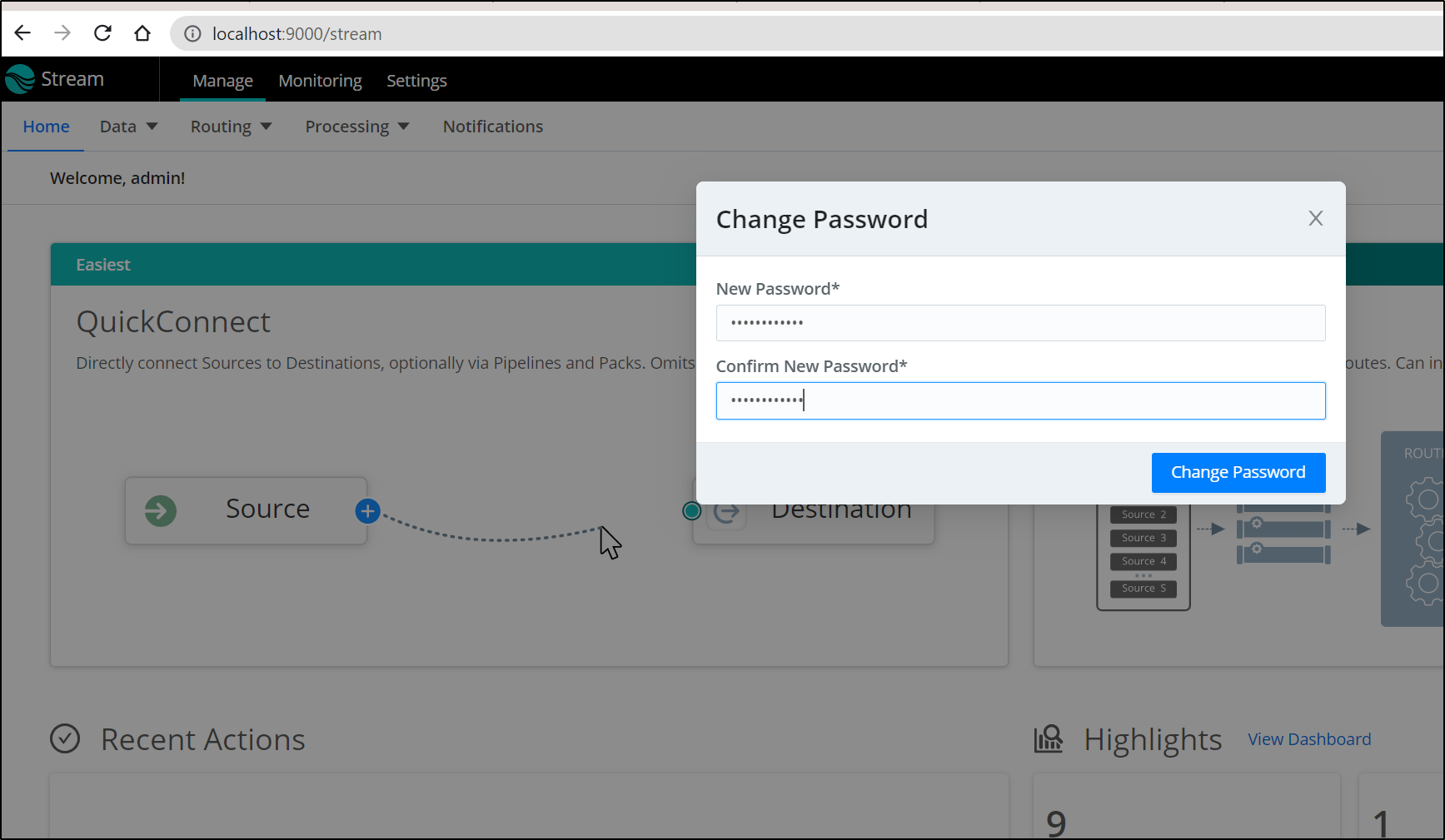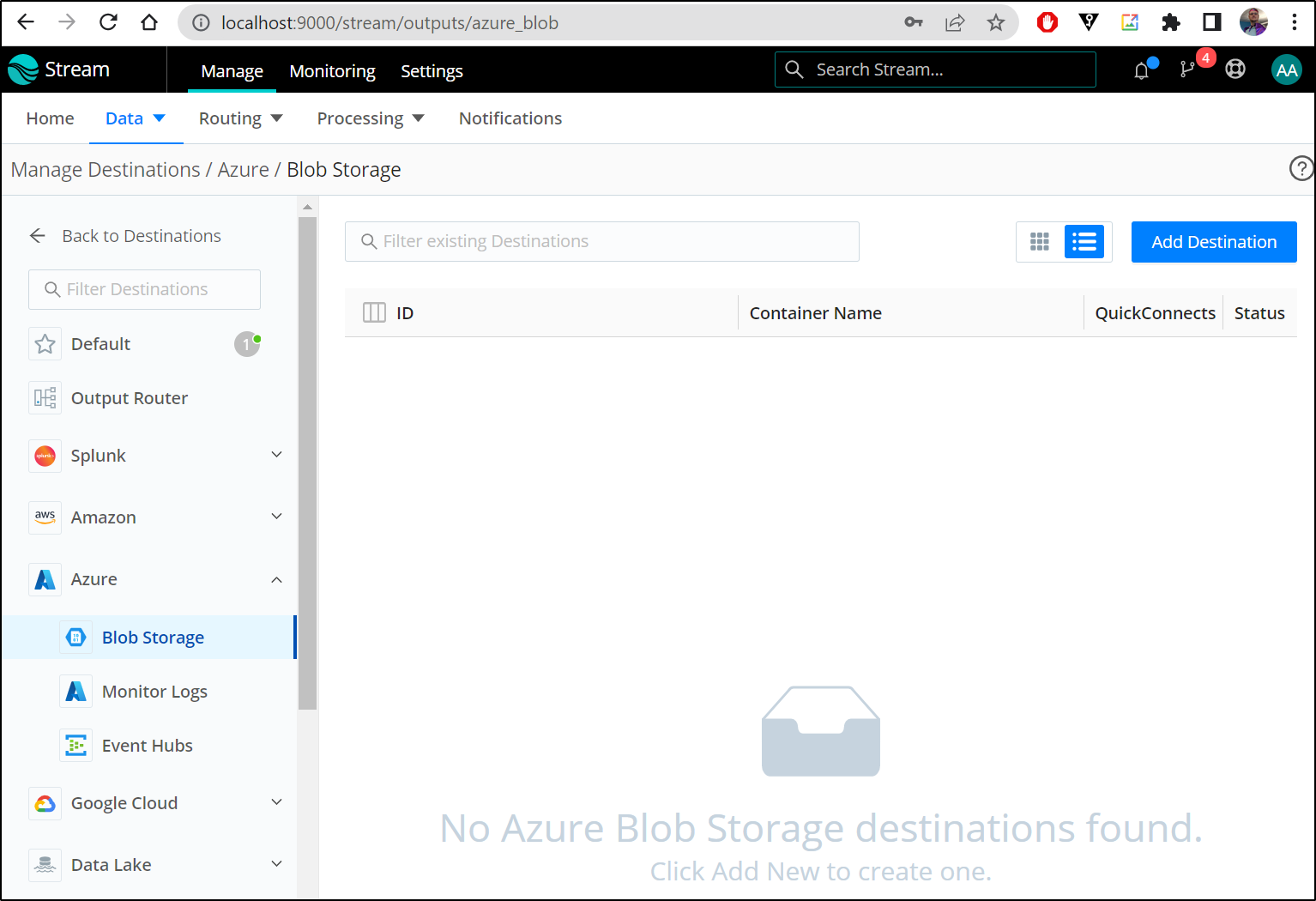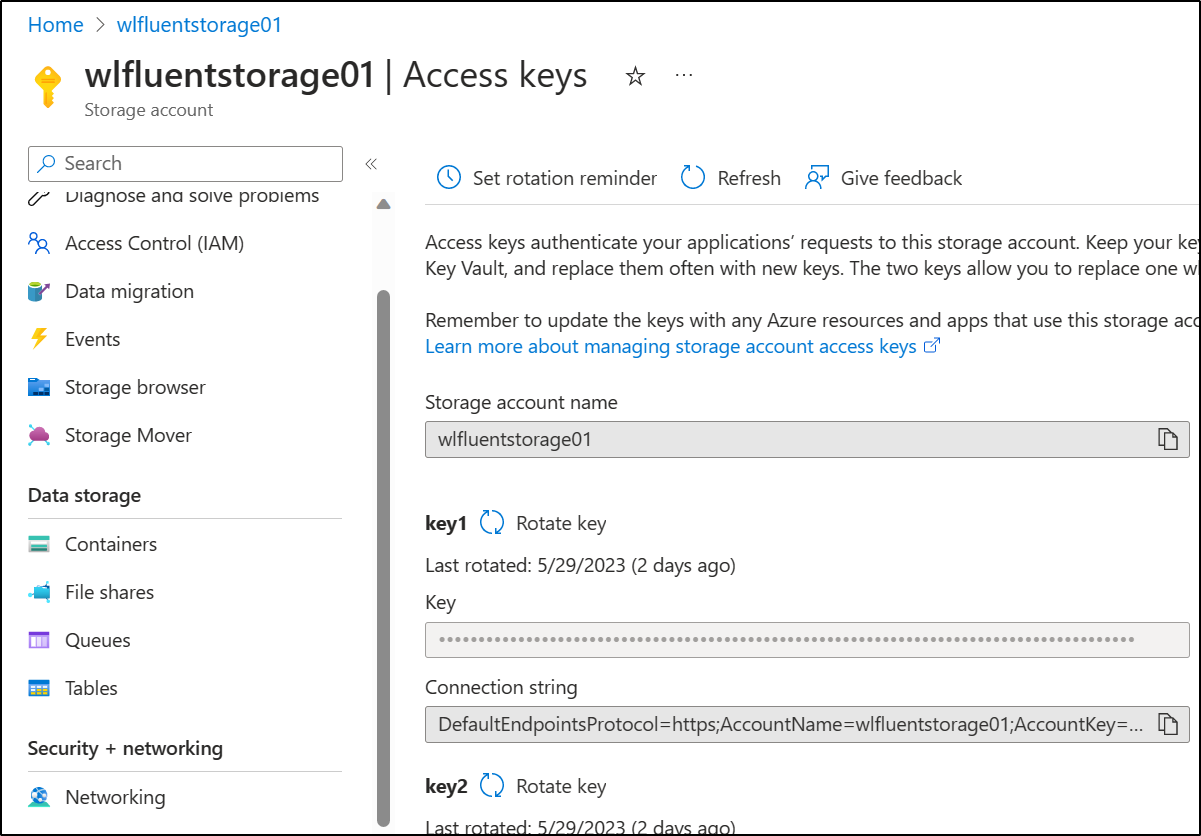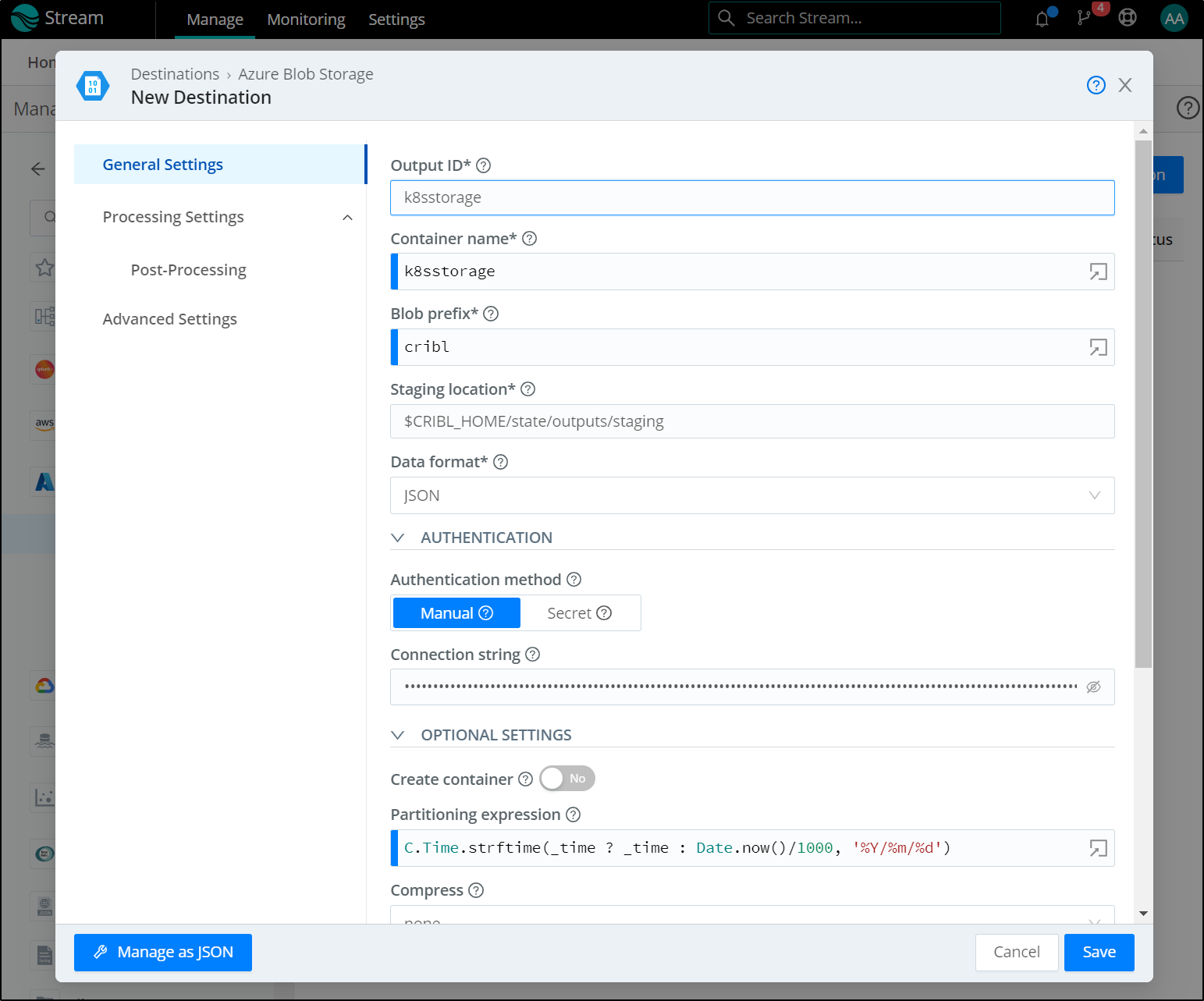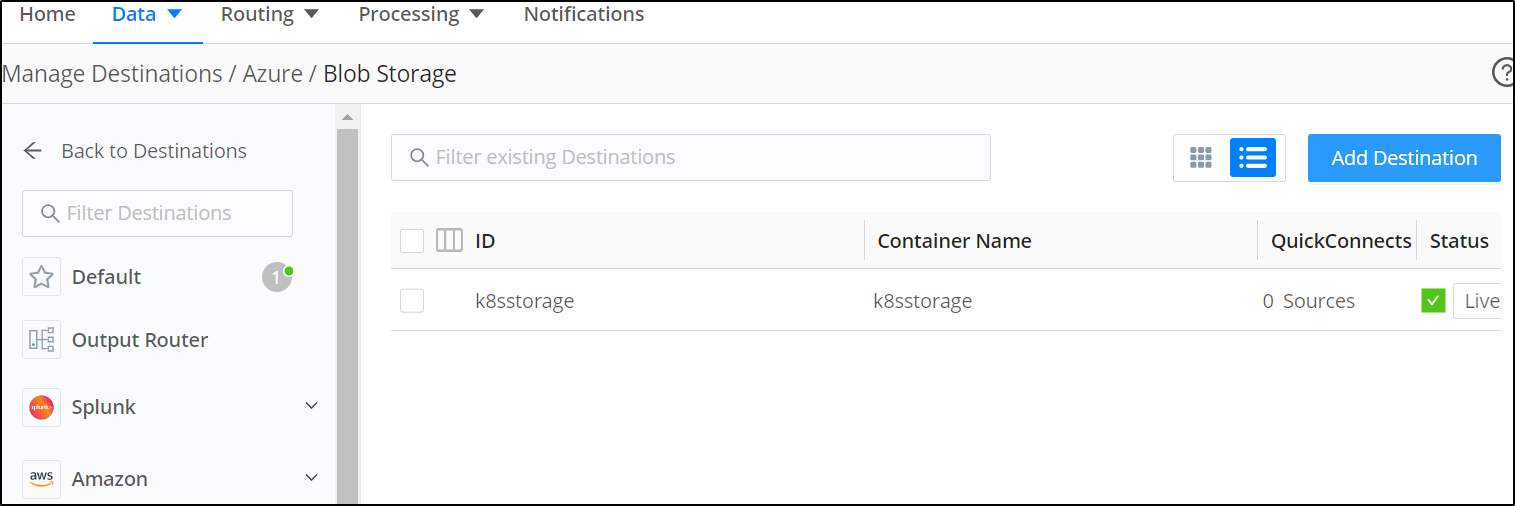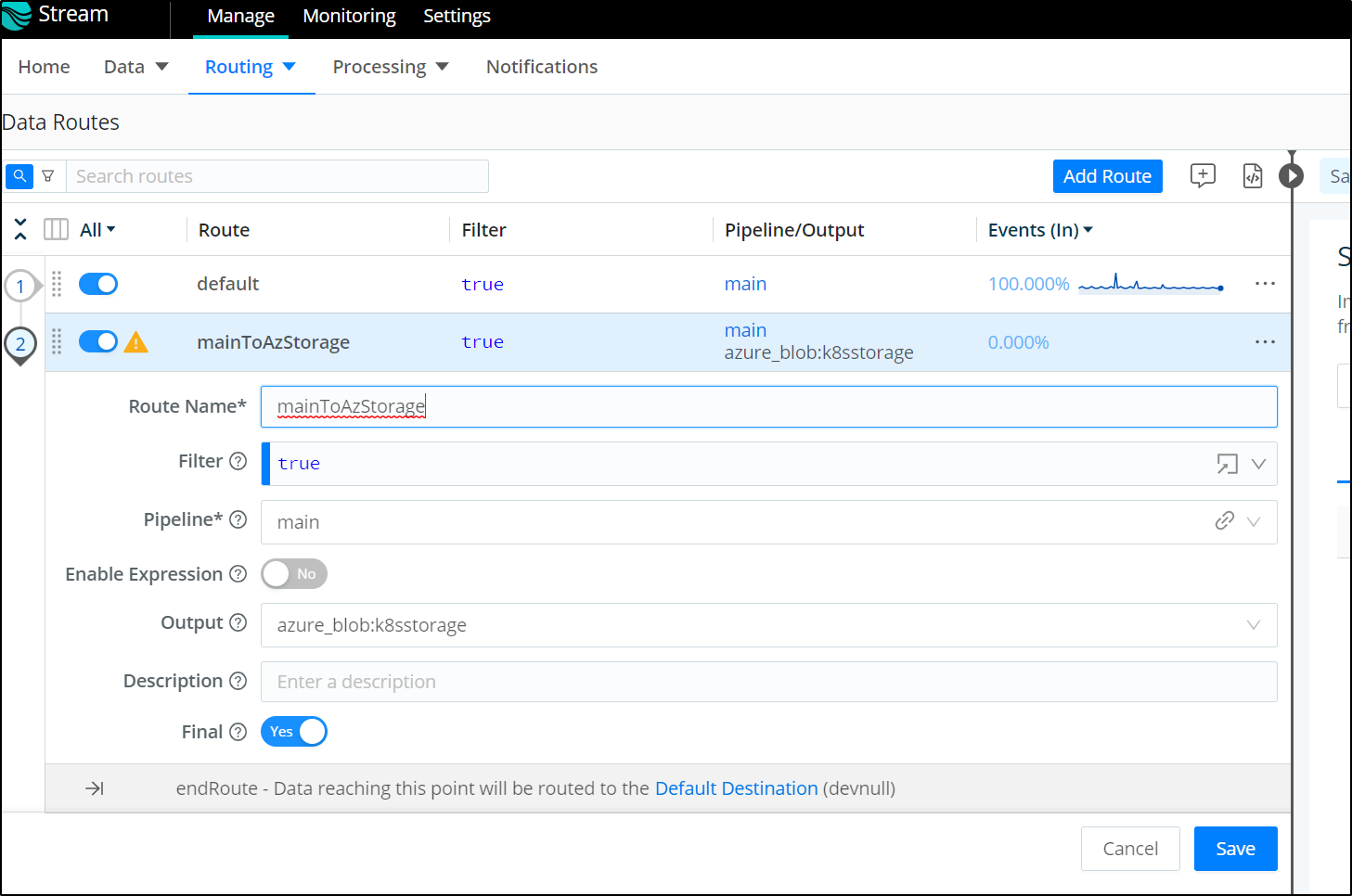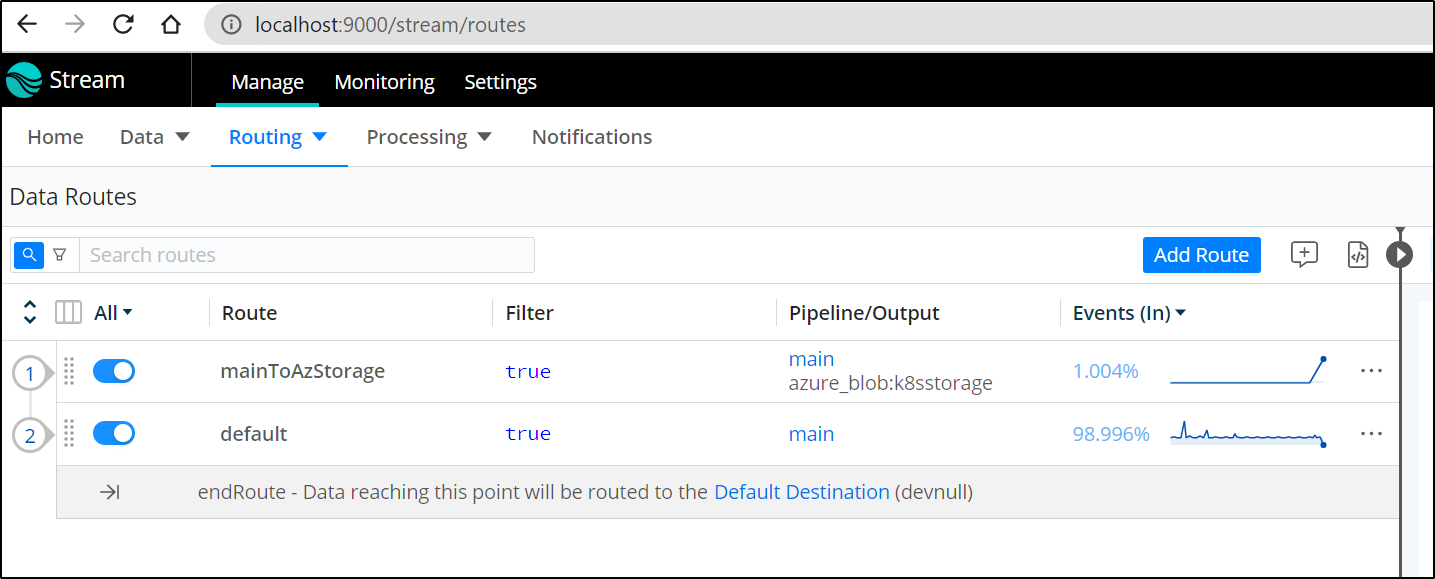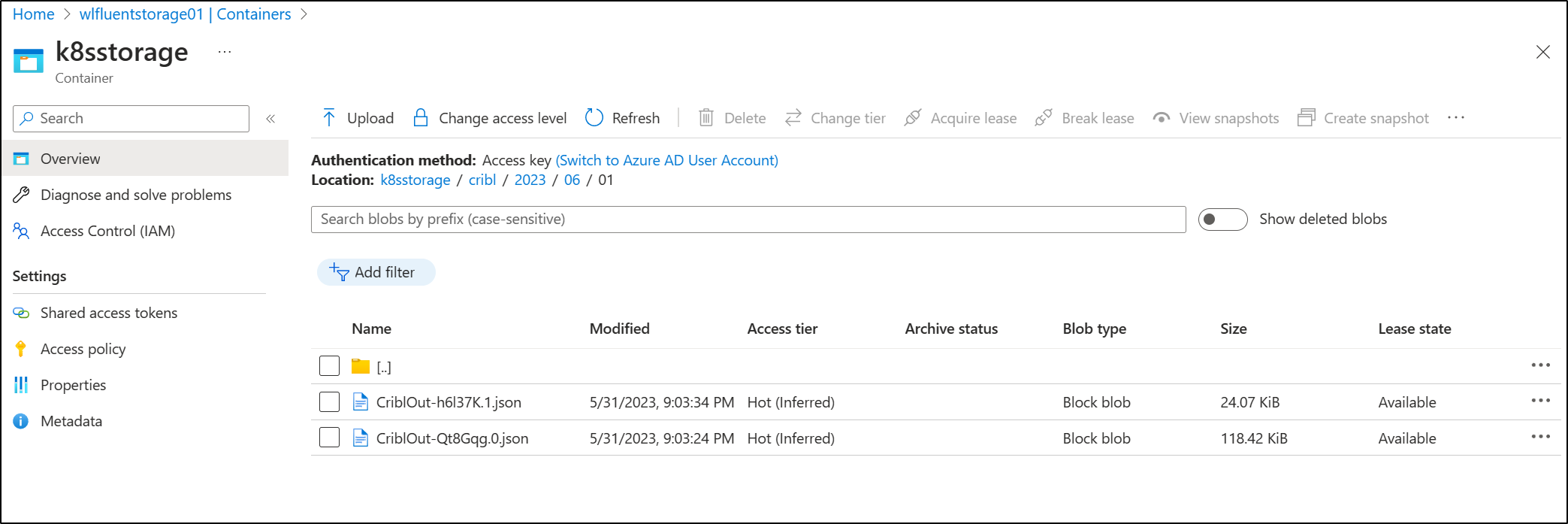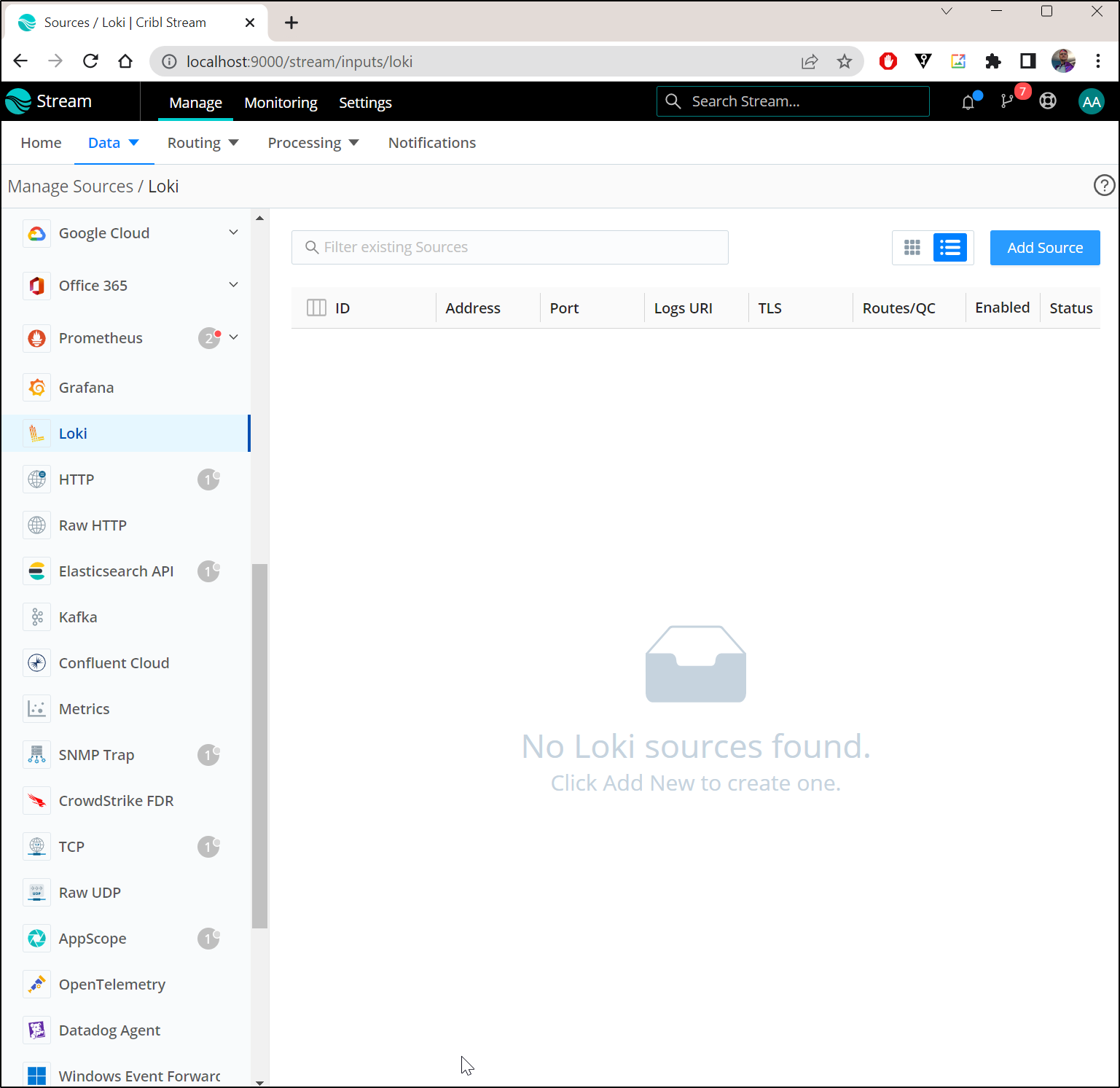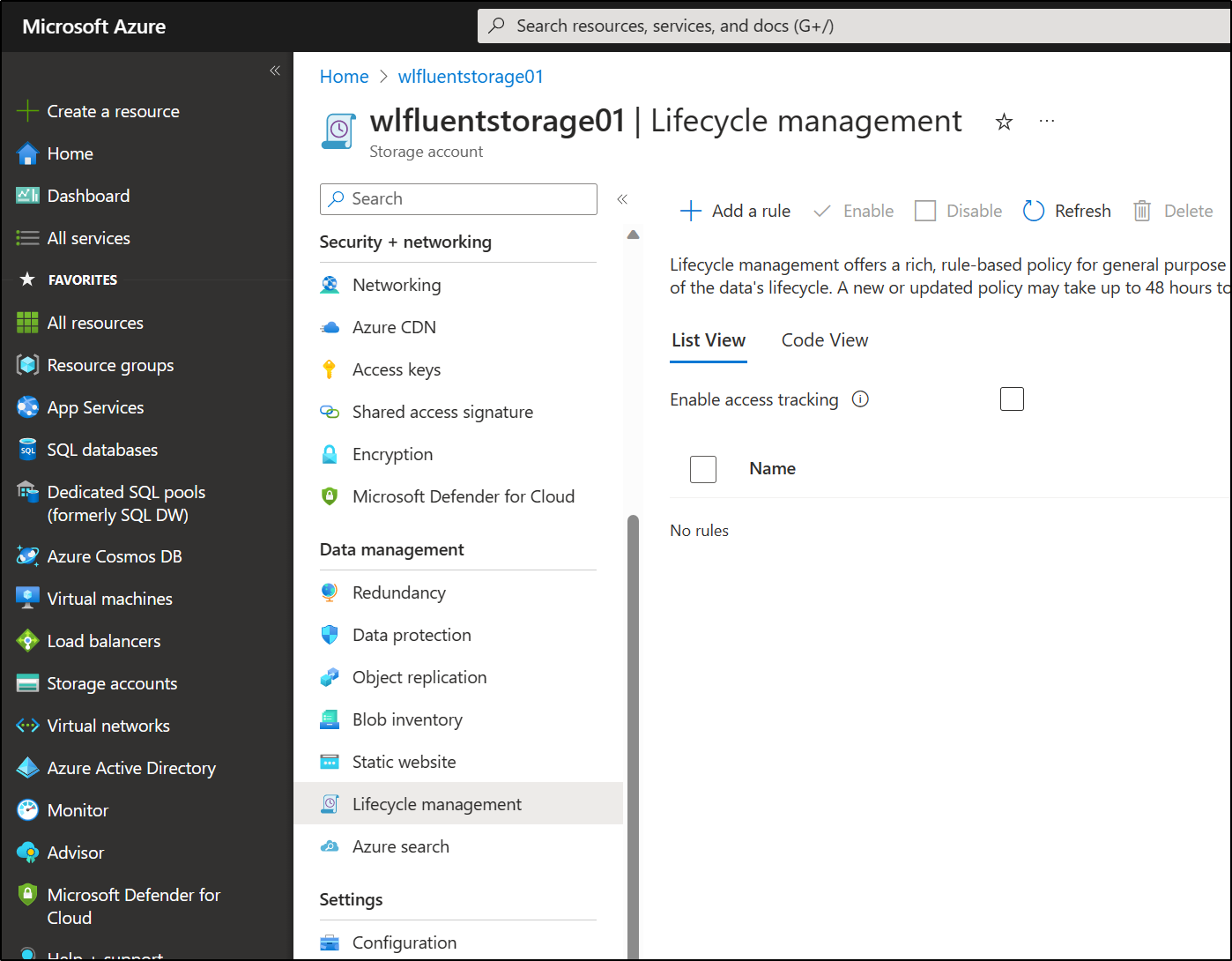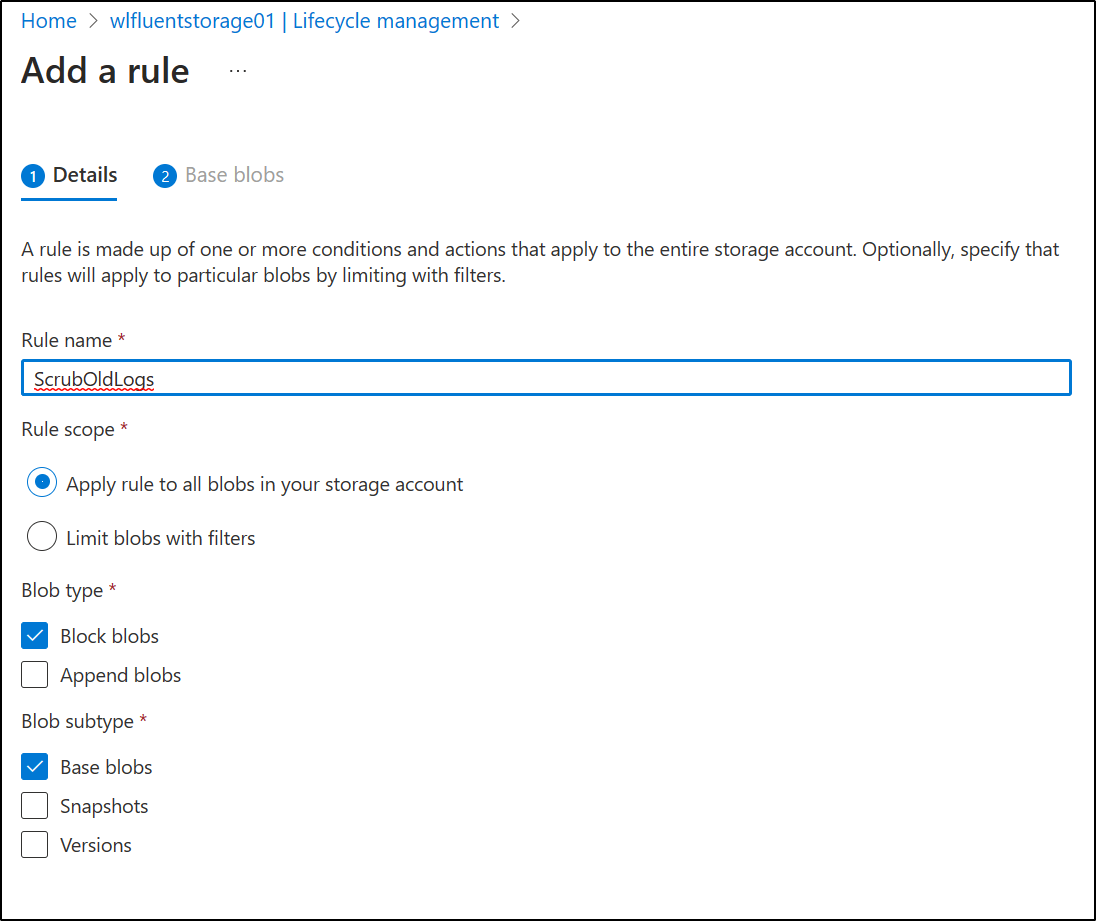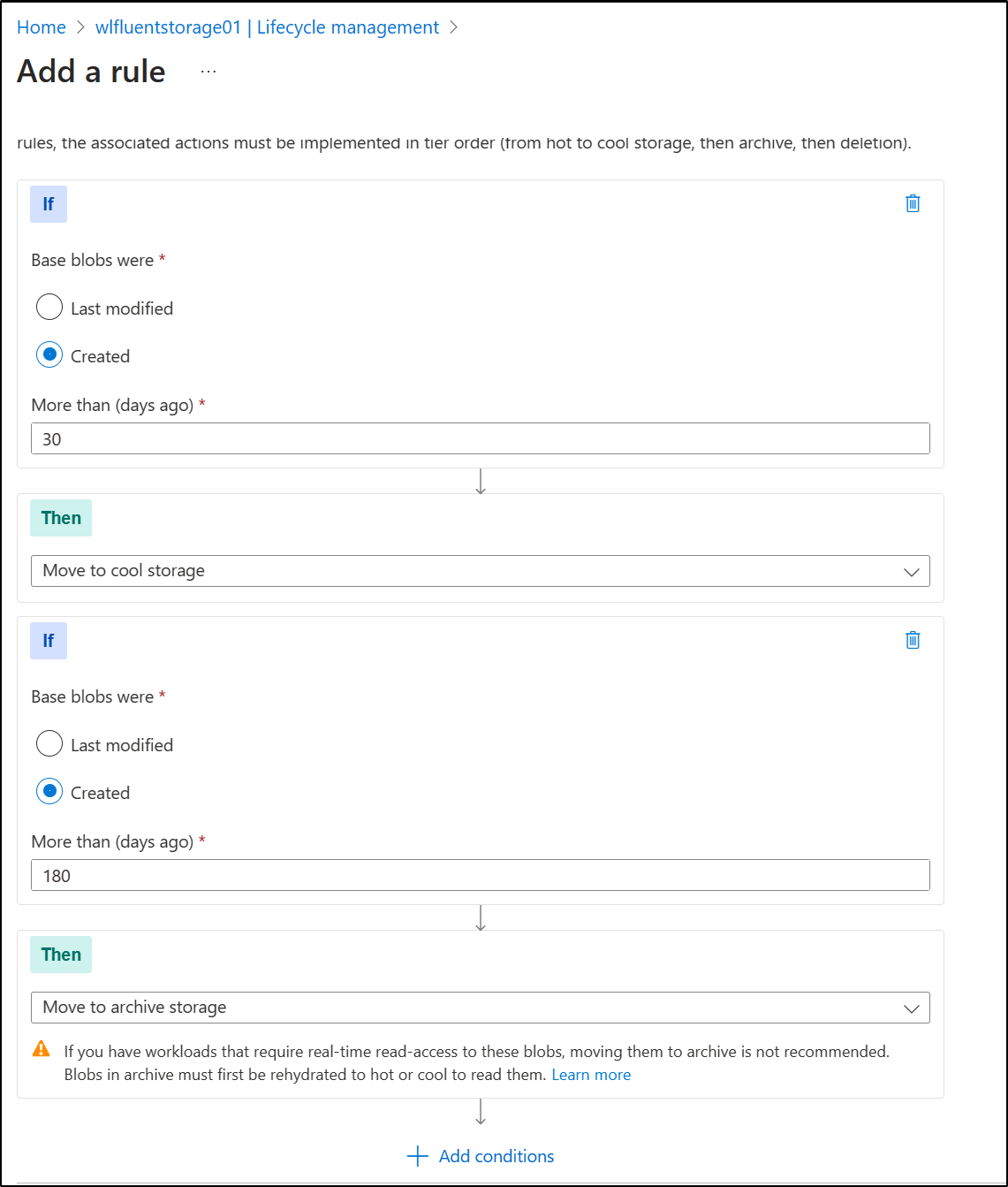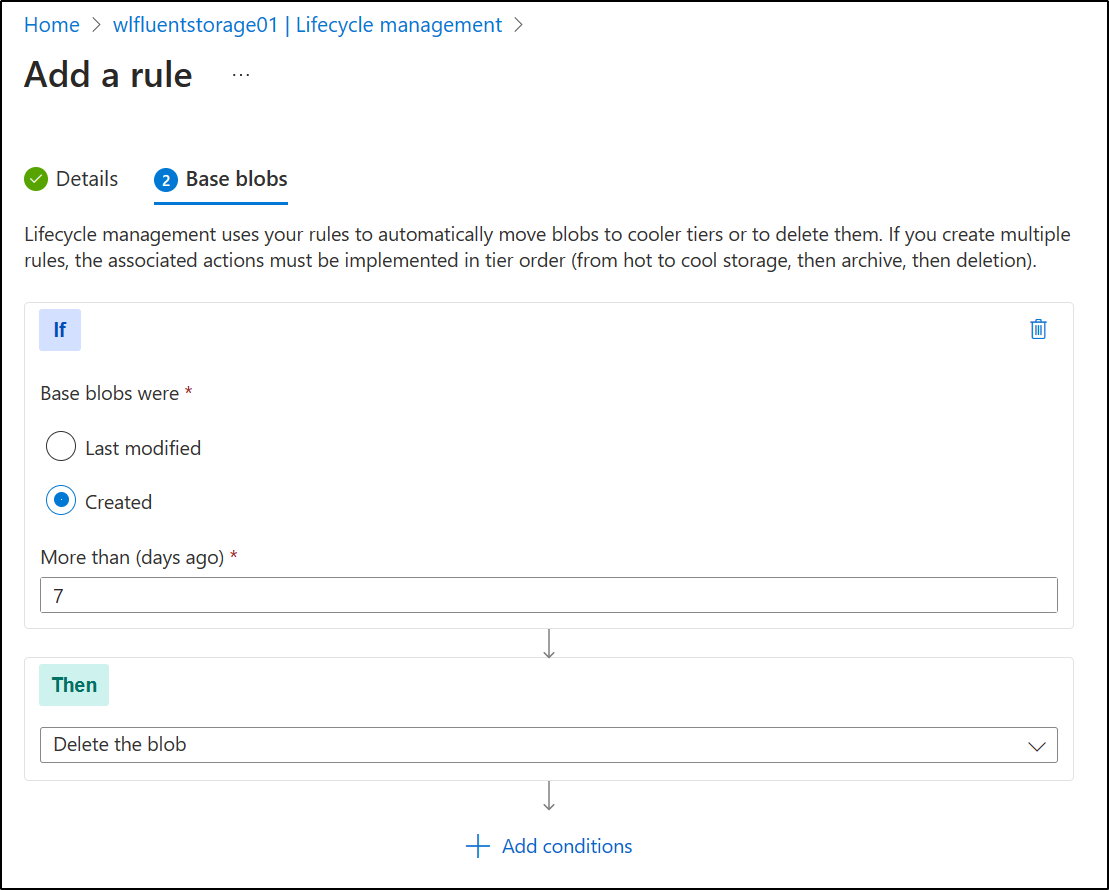Published: May 31, 2023 by Isaac Johnson
A lot of time I need to handle growing logs. More often than not, I’ll use suites like DataDog to ingest logs, but when I need to store right to the cloud, I have to go another route. In this blog we’ll set up an Azure Storage account, configure fluentd, logrotate and lastly Cribl to store metrics and logs there.
Lastly, we address the storage lifecycle policy to minimize costs.
Create Azure Storage
Let’s first create a storage account resource group
$ az account set --subscription "Pay-As-You-Go"
$ az group create -n wlstorageaccrg --location centralus
{
"id": "/subscriptions/d955c0ba-13dc-44cf-a29a-8fed74cbb22d/resourceGroups/wlstorageaccrg",
"location": "centralus",
"managedBy": null,
"name": "wlstorageaccrg",
"properties": {
"provisioningState": "Succeeded"
},
"tags": null,
"type": "Microsoft.Resources/resourceGroups"
}
Then we can create a Storage account
$ az storage account create -n wlfluentstorage01 -g wlstorageaccrg --location centralus --sku Standard_LRS
The behavior of this command has been altered by the following extension: storage-preview
{
"accessTier": "Hot",
"allowBlobPublicAccess": true,
"allowCrossTenantReplication": null,
"allowSharedKeyAccess": null,
"allowedCopyScope": null,
"azureFilesIdentityBasedAuthentication": null,
... snip ...
"statusOfPrimary": "available",
"statusOfSecondary": null,
"storageAccountSkuConversionStatus": null,
"tags": {},
"type": "Microsoft.Storage/storageAccounts"
}
Now we can create a container we can use
$ az storage container create --account-name wlfluentstorage01 --name k8sstorage
There are no credentials provided in your command and environment, we will query for account key for your storage account.
It is recommended to provide --connection-string, --account-key or --sas-token in your command as credentials.
You also can add `--auth-mode login` in your command to use Azure Active Directory (Azure AD) for authorization if your login account is assigned required RBAC roles.
For more information about RBAC roles in storage, visit https://docs.microsoft.com/azure/storage/common/storage-auth-aad-rbac-cli.
In addition, setting the corresponding environment variables can avoid inputting credentials in your command. Please use --help to get more information about environment variable usage.
{
"created": true
}
for the next step, we will want the Storage Account Name, Account Key and the Container Name.
We just created them, but if we wanted to see them, we could use
$ az storage account show -n wlfluentstorage01 -g wlstorageaccrg --query "[name,primaryEndpoints.blob]" -o tsv
wlfluentstorage01
https://wlfluentstorage01.blob.core.windows.net/
to show the Primary blob container and storage account name.
We use a different command for the storage account access key
$ az storage account keys list -n wlfluentstorage01 -g wlstorageaccrg --query "[0].value" -o tsv
XvWnqWALiT6gViACfS9RjmgPRdgqJ0cxJi0MKnCwLJJbud/zsErCUK0rB89ZiLlC/MtV2JtH6aRt+AStE/qDYg==
Bitnami Flue Chart
Let’s add the Bitnami repo if not there
$ helm repo add bitnami https://charts.bitnami.com/bitnami
"bitnami" already exists with the same configuration, skipping
$ helm repo update
Hang tight while we grab the latest from your chart repositories...
...Successfully got an update from the "zabbix-community" chart repository
...Successfully got an update from the "confluentinc" chart repository
...Successfully got an update from the "opencost" chart repository
...Successfully got an update from the "myharbor" chart repository
...Successfully got an update from the "freshbrewed" chart repository
...Successfully got an update from the "kube-state-metrics" chart repository
...Successfully got an update from the "adwerx" chart repository
...Successfully got an update from the "uptime-kuma" chart repository
...Successfully got an update from the "jfelten" chart repository
...Successfully got an update from the "kuma" chart repository
...Successfully got an update from the "dapr" chart repository
...Successfully got an update from the "rhcharts" chart repository
...Successfully got an update from the "novum-rgi-helm" chart repository
...Successfully got an update from the "castai-helm" chart repository
...Successfully got an update from the "kubecost" chart repository
...Successfully got an update from the "epsagon" chart repository
...Successfully got an update from the "harbor" chart repository
...Successfully got an update from the "hashicorp" chart repository
...Successfully got an update from the "longhorn" chart repository
...Successfully got an update from the "elastic" chart repository
...Successfully got an update from the "lifen-charts" chart repository
...Successfully got an update from the "nginx-stable" chart repository
...Successfully got an update from the "sonarqube" chart repository
...Successfully got an update from the "rook-release" chart repository
...Successfully got an update from the "open-telemetry" chart repository
...Successfully got an update from the "ngrok" chart repository
...Successfully got an update from the "signoz" chart repository
...Successfully got an update from the "argo-cd" chart repository
...Successfully got an update from the "datadog" chart repository
...Successfully got an update from the "grafana" chart repository
...Successfully got an update from the "gitlab" chart repository
...Successfully got an update from the "prometheus-community" chart repository
...Successfully got an update from the "incubator" chart repository
...Successfully got an update from the "actions-runner-controller" chart repository
...Successfully got an update from the "azure-samples" chart repository
...Successfully got an update from the "bitnami" chart repository
...Successfully got an update from the "sumologic" chart repository
...Successfully got an update from the "rancher-latest" chart repository
...Successfully got an update from the "newrelic" chart repository
...Successfully got an update from the "crossplane-stable" chart repository
Update Complete. ⎈Happy Helming!⎈
We can now install Fluentd with the Azure Values
$ helm install my-fluent-az-storage bitnami/fluentd --set plugins.azure-storage-append-blob.enabled=true --set plugins.azure-storage-append-blob.storageAccountName=wlfluentstorage01 --set plugins.azure-storage-append-blob.storageAccountKey=XvWnqWALiT6gViACfS9RjmgPRdgqJ0cxJi0MKnCwLJJbud/zsErCUK0rB89ZiLlC/MtV2JtH6aRt+AStE/qDYg== --set plugins.azure-storage-append-blob.containerName=k8sstorage
NAME: my-fluent-az-storage
LAST DEPLOYED: Mon May 29 14:28:58 2023
NAMESPACE: wldemo2
STATUS: deployed
REVISION: 1
TEST SUITE: None
NOTES:
CHART NAME: fluentd
CHART VERSION: 5.8.2
APP VERSION: 1.16.1
** Please be patient while the chart is being deployed **
To verify that Fluentd has started, run:
kubectl get all -l "app.kubernetes.io/name=fluentd,app.kubernetes.io/instance=my-fluent-az-storage"
Logs are captured on each node by the forwarder pods and then sent to the aggregator pods. By default, the aggregator pods send the logs to the standard output.
You can see all the logs by running this command:
kubectl logs -l "app.kubernetes.io/component=aggregator"
You can mount your own configuration files to the aggregators and the forwarders. For example, this is useful if you want to forward the aggregated logs to Elasticsearch or another service.
I tried several tricks to get it to create logs, but I found none were made.
YAML
Let’s go another route.
I’ll remove the Helm deploy
$ helm delete my-fluent-az-storage
release "my-fluent-az-storage" uninstalled
I’ll encode the Account Name and Key as base64 so i can use them in a secret
$ echo XvWnqWALiT6gViACfS9RjmgPRdgqJ0cxJi0MKnCwLJJbud/zsErCUK0rB89ZiLlC/MtV2JtH6aRt+AStE/qDYg== | base64 -w
0
WHZXbnFXQUxpVDZnVmlBQ2ZTOVJqbWdQUmRncUowY3hKaTBNS25Dd0xKSmJ1ZC96c0VyQ1VLMHJCODlaaUxsQy9NdFYySnRINmFSdCtBU3RFL3FEWWc9PQo=
$ echo wlfluentstorage01 | base64
d2xmbHVlbnRzdG9yYWdlMDEK
Then create a Secret to apply
$ cat createSecret.yaml
apiVersion: v1
kind: Secret
metadata:
name: azure-secret
type: Opaque
data:
account-name: d2xmbHVlbnRzdG9yYWdlMDEK
account-key: WHZXbnFXQUxpVDZnVmlBQ2ZTOVJqbWdQUmRncUowY3hKaTBNS25Dd0xKSmJ1ZC96c0VyQ1VLMHJCODlaaUxsQy9NdFYySnRINmFSdCtBU3RFL3FEWWc9PQo=
$ kubectl apply -f ./createSecret.yaml
secret/azure-secret created
Next, I create a CM with the same values
$ cat ./fluentCM.yaml
apiVersion: v1
kind: ConfigMap
metadata:
name: fluentd-config
data:
fluent.conf: |
<source>
@type tail
path /var/log/containers/*.log
pos_file /var/log/fluentd-containers.log.pos
tag kubernetes.*
read_from_head true
<parse>
@type json
time_format %Y-%m-%dT%H:%M:%S.%NZ
</parse>
</source>
<match kubernetes.**>
@type azurestorageappendblob
azure_storage_account wlfluentstorage01
azure_storage_access_key XvWnqWALiT6gViACfS9RjmgPRdgqJ0cxJi0MKnCwLJJbud/zsErCUK0rB89ZiLlC/MtV2JtH6aRt+AStE/qDYg==
azure_container_name k8sstorage
path logs/%Y/%m/%d/
time_slice_format %Y%m%d-%H%M%S
buffer_chunk_limit 256m
</match>
$ kubectl apply -f ./fluentCM.yaml
configmap/fluentd-config created
Next, let’s create the Fluent DS
$ cat fluentDS.yaml
apiVersion: apps/v1
kind: DaemonSet
metadata:
name: fluentd
spec:
selector:
matchLabels:
app: fluentd
template:
metadata:
labels:
app: fluentd
spec:
containers:
- name: fluentd
image: fluent/fluentd-kubernetes-daemonset:v1.16.1-debian-azureblob-1.2
env:
- name: AZURE_STORAGE_ACCOUNT_NAME
valueFrom:
secretKeyRef:
name: azure-secret
key: account-name
- name: AZURE_STORAGE_ACCOUNT_KEY
valueFrom:
secretKeyRef:
name: azure-secret
key: account-key
volumeMounts:
- name: varlogcontainers
mountPath: /var/log/containers/
readOnly: true
- name: config-volume
mountPath: /fluentd/etc/
resources:
limits:
memory: 500Mi
securityContext:
privileged: true
livenessProbe:
exec:
command:
- cat /tmp/fluentd-buffers.flb | grep -v '^\s*$' > /dev/null 2>&1 || exit 1; exit 0;
initialDelaySeconds: 30
periodSeconds: 10
volumeMounts:
- name: varlogcontainers
mountPath: /var/log/containers/
readOnly: true
- name: config-volume
mountPath: /fluentd/etc/
volumes:
- name: varlogcontainers
hostPath:
path: /var/log/containers
- name : config-volume
configMap :
name : fluentd-config
$ kubectl apply -f fluentDS.yaml
daemonset.apps/fluentd created
Let’s try Loki
$ cat loki-values2.yaml
loki:
storage:
azure:
account_key: XvWnqWALiT6gViACfS9RjmgPRdgqJ0cxJi0MKnCwLJJbud/zsErCUK0rB89ZiLlC/MtV2JtH6aRt+AStE/qDYg==
account_name: wlfluentstorage01
container_name: k8sstorage
auth_enabled: false
Then we can install
$ helm install --values loki-values2.yaml loki grafana/loki
NAME: loki
LAST DEPLOYED: Tue May 30 06:48:33 2023
NAMESPACE: default
STATUS: deployed
REVISION: 1
NOTES:
***********************************************************************
Welcome to Grafana Loki
Chart version: 5.5.11
Loki version: 2.8.2
***********************************************************************
Installed components:
* grafana-agent-operator
* gateway
* read
* write
* backend
I can almost immediately see Loki is writing things to Azure Storage
To add logs, I would need Promtail with values to push to Loki
$ cat promtail-values.yaml
config:
clients:
- url: http://loki-gateway.default.svc.cluster.local:80/loki/api/v1/push
logLevel: info
serverPort: 3101
lokiAddress: http://loki-gateway.default.svc.cluster.local:80/loki/api/v1/push
$ helm upgrade --install -f promtail-values.yaml promtail grafana/promtail
Store logs to Azure Storage
Maybe my goal is to just get logs to Azure Storage, regardless of how.
For this, I can use BlobFuse v1
I’ll first setup the apt packages
builder@builder-T100:/etc/filebeat$ sudo wget https://packages.microsoft.com/config/ubuntu/20.04/packages-microsoft-prod.deb
microsoft-prod.deb
sudo apt-get update--2023-05-31 17:43:25-- https://packages.microsoft.com/config/ubuntu/20.04/packages-microsoft-prod.deb
Resolving packages.microsoft.com (packages.microsoft.com)... 13.90.21.104
Connecting to packages.microsoft.com (packages.microsoft.com)|13.90.21.104|:443... connected.
HTTP request sent, awaiting response... 200 OK
Length: 3690 (3.6K) [application/octet-stream]
Saving to: ‘packages-microsoft-prod.deb’
packages-microsoft-prod.deb 100%[============================================================================>] 3.60K --.-KB/s in 0s
2023-05-31 17:43:25 (352 MB/s) - ‘packages-microsoft-prod.deb’ saved [3690/3690]
builder@builder-T100:/etc/filebeat$ sudo dpkg -i packages-microsoft-prod.deb
Selecting previously unselected package packages-microsoft-prod.
(Reading database ... 190512 files and directories currently installed.)
Preparing to unpack packages-microsoft-prod.deb ...
Unpacking packages-microsoft-prod (1.0-ubuntu20.04.1) ...
Setting up packages-microsoft-prod (1.0-ubuntu20.04.1) ...
builder@builder-T100:/etc/filebeat$ sudo apt-get update
Hit:1 http://us.archive.ubuntu.com/ubuntu focal InRelease
Hit:2 https://download.docker.com/linux/ubuntu focal InRelease
Get:3 http://us.archive.ubuntu.com/ubuntu focal-updates InRelease [114 kB]
Get:4 http://security.ubuntu.com/ubuntu focal-security InRelease [114 kB]
Get:5 https://packages.microsoft.com/ubuntu/20.04/prod focal InRelease [3,611 B]
Get:6 http://us.archive.ubuntu.com/ubuntu focal-backports InRelease [108 kB]
Get:7 https://packages.microsoft.com/ubuntu/20.04/prod focal/main arm64 Packages [41.0 kB]
Get:8 https://packages.microsoft.com/ubuntu/20.04/prod focal/main all Packages [2,521 B]
Get:9 https://packages.microsoft.com/ubuntu/20.04/prod focal/main amd64 Packages [201 kB]
Get:10 http://us.archive.ubuntu.com/ubuntu focal-updates/main amd64 Packages [2,611 kB]
Get:11 https://packages.microsoft.com/ubuntu/20.04/prod focal/main armhf Packages [14.4 kB]
Get:12 http://security.ubuntu.com/ubuntu focal-security/main amd64 DEP-11 Metadata [59.9 kB]
Get:13 http://security.ubuntu.com/ubuntu focal-security/universe amd64 DEP-11 Metadata [95.5 kB]
Get:14 http://security.ubuntu.com/ubuntu focal-security/multiverse amd64 DEP-11 Metadata [940 B]
Hit:15 http://apt.postgresql.org/pub/repos/apt focal-pgdg InRelease
Get:16 http://us.archive.ubuntu.com/ubuntu focal-updates/main i386 Packages [836 kB]
Get:17 http://us.archive.ubuntu.com/ubuntu focal-updates/main Translation-en [439 kB]
Get:18 http://us.archive.ubuntu.com/ubuntu focal-updates/main amd64 DEP-11 Metadata [275 kB]
Get:19 http://us.archive.ubuntu.com/ubuntu focal-updates/main amd64 c-n-f Metadata [16.8 kB]
Get:20 http://us.archive.ubuntu.com/ubuntu focal-updates/universe amd64 Packages [1,067 kB]
Get:21 http://us.archive.ubuntu.com/ubuntu focal-updates/universe i386 Packages [730 kB]
Get:22 http://us.archive.ubuntu.com/ubuntu focal-updates/universe amd64 DEP-11 Metadata [409 kB]
Get:23 http://us.archive.ubuntu.com/ubuntu focal-updates/multiverse amd64 DEP-11 Metadata [944 B]
Get:24 http://us.archive.ubuntu.com/ubuntu focal-backports/main amd64 DEP-11 Metadata [7,996 B]
Get:25 http://us.archive.ubuntu.com/ubuntu focal-backports/universe amd64 DEP-11 Metadata [30.5 kB]
Fetched 7,177 kB in 2s (3,938 kB/s)
Reading package lists... Done
N: Skipping acquire of configured file 'main/binary-i386/Packages' as repository 'http://apt.postgresql.org/pub/repos/apt focal-pgdg InRelease' doesn't support architecture 'i386'
Then I can install Blobfuse
builder@builder-T100:/etc/filebeat$ sudo apt-get install blobfuse
Reading package lists... Done
Building dependency tree
Reading state information... Done
The following packages were automatically installed and are no longer required:
gir1.2-goa-1.0 libfprint-2-tod1 libfwupdplugin1 libxmlb1
Use 'sudo apt autoremove' to remove them.
The following NEW packages will be installed:
blobfuse
0 upgraded, 1 newly installed, 0 to remove and 25 not upgraded.
Need to get 10.1 MB of archives.
After this operation, 35.6 MB of additional disk space will be used.
Get:1 https://packages.microsoft.com/ubuntu/20.04/prod focal/main amd64 blobfuse amd64 1.4.5 [10.1 MB]
Fetched 10.1 MB in 1s (14.0 MB/s)
Selecting previously unselected package blobfuse.
(Reading database ... 190520 files and directories currently installed.)
Preparing to unpack .../blobfuse_1.4.5_amd64.deb ...
Unpacking blobfuse (1.4.5) ...
Setting up blobfuse (1.4.5) ...
I’ll create a directory to be my mount
builder@builder-T100:/etc/filebeat$ sudo mkdir /var/azurelogs
builder@builder-T100:/etc/filebeat$ sudo chown builder /var/azurelogs
And we need a temp dir as well
builder@builder-T100:/etc/filebeat$ sudo mkdir -p /mnt/resource/blobfusetmp
builder@builder-T100:/etc/filebeat$ sudo chown builder /mnt/resource/blobfusetmp
Then create an Azure configuration for my storage account
builder@builder-T100:/etc/filebeat$ vi /home/builder/azure.cfg
builder@builder-T100:/etc/filebeat$ cat /home/builder/azure.cfg
accountName wlfluentstorage01
accountKey XvWnqWALiT6gViACfS9RjmgPRdgqJ0cxJi0MKnCwLJJbud/zsErCUK0rB89ZiLlC/MtV2JtH6aRt+AStE/qDYg==
containerName k8sstorage
Then lastly mount it
builder@builder-T100:/etc/filebeat$ sudo blobfuse /var/azurelogs --tmp-path=/mnt/resource/blobfusetmp --config-file=/home/builder/azure.cfg -o attr_timeout=240 -o entry_timeout=240 -o negative_timeout=120
Interestingly I found that i could copy files as root, but sudo didn’t seem to care for the command
builder@builder-T100:/etc/filebeat$ ls /var/azurelogs
ls: cannot access '/var/azurelogs': Permission denied
builder@builder-T100:/etc/filebeat$ sudo ls /var/azurelogs
index loki_cluster_seed.json
builder@builder-T100:/etc/filebeat$ sudo echo "hi" > /var/azurelogs/test.txt
-bash: /var/azurelogs/test.txt: Permission denied
builder@builder-T100:/etc/filebeat$ sudo mkdir /var/azurelogs/test
builder@builder-T100:/etc/filebeat$ sudo echo "hi" > /var/azurelogs/test/test.txt
-bash: /var/azurelogs/test/test.txt: Permission denied
# as root
builder@builder-T100:/etc/filebeat$ sudo su -
root@builder-T100:~# echo "hi" > /var/azurelogs/test/test.txt
root@builder-T100:~#
Now in Logrotate, let’s rotate files into there. Normally we would use daily, but I’ll set to hourly
builder@builder-T100:/etc/logrotate.d$ sudo vi azurelogs
builder@builder-T100:/etc/logrotate.d$ cat azurelogs
/var/log/auth.log {
su root root
rotate 7
daily
compress
dateext
dateformat .%Y-%m-%d
postrotate
cp /var/log/auth.log.$(date +%Y-%m-%d) /tmp/auth.log.$(date +%Y-%m-%d)
chown root:root /tmp/auth.log.$(date +%Y-%m-%d)
cp /tmp/auth.log.$(date +%Y-%m-%d) /var/azurelogs/auth.log-$(date +%Y%m%d)
endscript
}
Lastly, restart rsyslog
$ sudo service rsyslog restart
I can now test
root@builder-T100:~# echo hi | tee /var/log/auth.log
hi
root@builder-T100:~# logrotate --force /etc/logrotate.d/azurelogs
root@builder-T100:~# ls -l /var/azurelogs/
total 8
-rwxrwx--- 1 root root 3 May 31 19:35 auth.log-20230531
drwxrwx--- 2 root root 4096 Dec 31 1969 index
-rwxrwx--- 1 root root 251 May 30 06:49 loki_cluster_seed.json
-rwxrwx--- 1 root root 9204 May 31 19:20 syslog.2.gz
drwxrwx--- 2 root root 4096 May 31 17:54 test
root@builder-T100:~#
I can see that in Azure as well
Cribl
I’ll first add the Helm chart
$ helm repo add cribl https://criblio.github.io/helm-charts/
"cribl" already exists with the same configuration, skipping
I can then install using my preferred storage class
$ helm install logstream-leader cribl/logstream-leader --set config.scName='managed-nfs-storage'
NAME: logstream-leader
LAST DEPLOYED: Wed May 31 19:46:02 2023
NAMESPACE: default
STATUS: deployed
REVISION: 1
TEST SUITE: None
I’ll wait for it to come up
$ kubectl get pods -l app.kubernetes.io/instance=logstream-leader
NAME READY STATUS RESTARTS AGE
logstream-leader-77967db6cd-bj88r 1/1 Running 0 95s
I’ll now port-forward
$ kubectl port-forward svc/logstream-leader 9000:9000
Forwarding from 127.0.0.1:9000 -> 9000
Forwarding from [::1]:9000 -> 9000
Handling connection for 9000
I login with the default “admin/admin” and accept the EULA
We immediately set a password for admin
I’ll add a destination for Azure Blob Storage
This will need a connection string we can get from the Storage Account in the Keys area
We can enter here
which we can now see saved
I can then create a Route to use it
I’ll then move the route to the first slot
After enabling some basic inputs, I can see Cribl data written to the Azure Storage container
I can add other inputs, but we will save it for later
Lifecycle Policies
One thing you need to make sure you do for a storage container holding logs is to set a Lifecycle Policy
Give it a name
At the least, we can create a policy that moves to Cool then Archive Storage
Or just delete after a week
Summary
Today we setup a fresh Azure storage account and configured Fluentd. We touched on Loki and setup Logrotate after mounting with BlobFuse. Finally, we setup a local Cribl Stream instance to send data and logs to Azure Storage as a Destination on a Route. We’ll explore more on that later, but hopefully you have some starting points to getting Azure Storage working for log storage.


